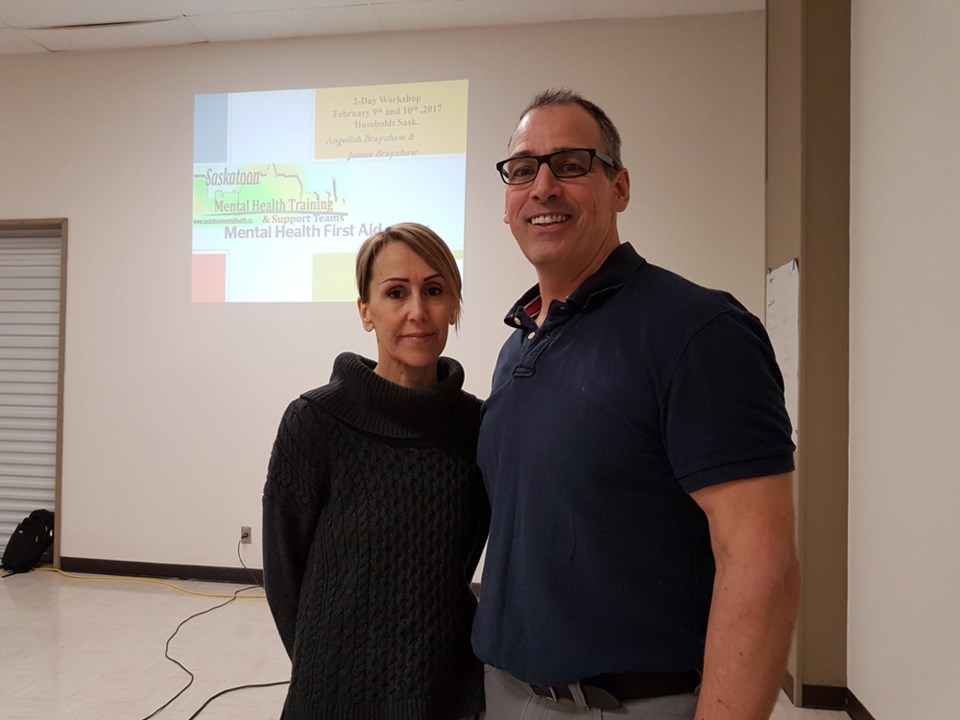If someone is in medical distress, we try to help them.
At a time when 1 in 3 Canadians will experience problems with a mental illness in their lifetime, the Mental Health Commission of Canada is providing Humboldt with mental health first aid through Saskatoon Mental Health Training and Support Team.
James Brayshaw, along with his wife, Angellah, were in town on Feb. 9-10 training people to spot the signs of a person in mental distress and how to intervene honestly and respectably.
Both James and Angellah have had a lot of experience with mental health problems within their family and friends.
“We saw how encouraging people to have meaningful dialogue about mental health, would lead to better support for those with mental health conditions and a greater likelihood for early intervention because of reduced stigma.”
Brayshaw says stigma keeps people from seeking help for mental health problems let alone receiving early diagnosis and finding the support they need to get well.
Stigma also affects the families, friends, and coworkers around the person as well.
“(Stigma) prevents families from having conversations about mental health problems that may surface in their families,” says Brayshaw.
Talking about this stigma among the group, workshop participants could not believe that this stigma is still so highly prevalent in Canada.
Brayshaw says that the group had a great discussion on how to approach and address this stigma.
“The answer was always let’s work on reducing stigma, the ones we carry and the ones we see socially and practice being a supportive, caring individual who wants to understand what’s going on.”
Talking about depression, psychotic disorders, anxiety disorders, mood disorders, and substance abuse disorders opened up the dialogue to talk about ways to assess the individual condition in a healthy way, not as a diagnostic way, says Brayshaw.
This is all part of the ALGEE action plan, he says.
If someone is going through a mental health problem, Brayshaw says an outside person can see their a noticeable distress, disruption, and then even debilitating interference to the person’s daily life.
It is the same when a person is in physical pain, says Brayshaw. As we watch people struggle we feel fine to intervene when back injury is causing a disruption in the person’s life, for example.
“If our physical health can be treated that way with openness, so should our mental health be,” says Brayshaw.
As a mental health first aider, the first step is assessing whether the person is at a risk to themselves but also assessing whether they are safe as well is the first step to approaching the person they think is at risk.
Opening up to the person as a source of support, the first aider must be genuine, accepting, empathetic, and frank.
Just ask the person honestly if they are okay and if they need to talk, says Brayshaw.
If someone has thoughts and plans to take their own life, anyone can call 911 or the RCMP on their behalf or even take someone in to Emergency at the hospital.
“To take the step with them to get them to the appropriate professional, often a person has to be fairly pointed in saying, ‘listen, I see you’re really having some struggles here. I want to go with you to talk to a councillor or talk to your doctor.”
Being this support can be a daunting idea but just like someone with mental illness is not alone, people who are willing to offer support for those with mental health are not alone either.
Brayshaw says if a person does not want to go alone to approach someone who they believe is having mental health problems, they can call a friend or find someone who is willing to offer their own support to the situation.
“You need support to give that person support. We don’t have to do it alone because you’re not responsible for anyone, anymore than they’re responsible for you.”
We may feel obligated to move in and provide care and support or even a solution for that person but Brayshaw says team up and work together to provide that support.
Mental Health First Aid training is provided in 27 countries and currently there are 200,000 Canadians equipped with this training.
The workshop in Humboldt was funded by the KidsFirst division of the Saskatoon Health Region.




